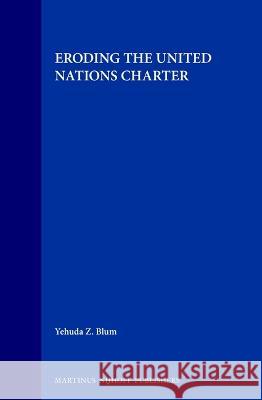Eroding the United Nations Charter » książka
Eroding the United Nations Charter
ISBN-13: 9780792320692 / Angielski / Twarda / 1993 / 308 str.
In this thoughtful and meticulously researched book, Professor Blum makes a major contribution to the exposure of an important aspect of UN practice. He adds to his academic analysis the insight provided by his years as his country's Ambassador at the UN, and provides the reader with a fascinating and well-written argument. The book reflects events and developments that took place prior to the summer of 1990, during the period marked by global confrontation between the two major power blocs of those days. That confrontation found one of its strongest expressions in the United Nations, and was largely responsible for the deterioration of the legal-constitutional climate within the UN. With the end of that confrontation, as a result of the collapse of the former Soviet bloc and the disintegration of the Soviet Union itself, a new climate of parliamentary cooperation within the United Nations has come about. Consequently, there would now appear to exist a real prospect - perhaps for the first time since the establishment of the Organization - for a reconsideration of at least some of the practices that developed over the years within the cold war context, and which constitute a departure from the legal-constitutional requirements laid down by the Charter. It is in this spirit this book is offered to the reader's attention.











